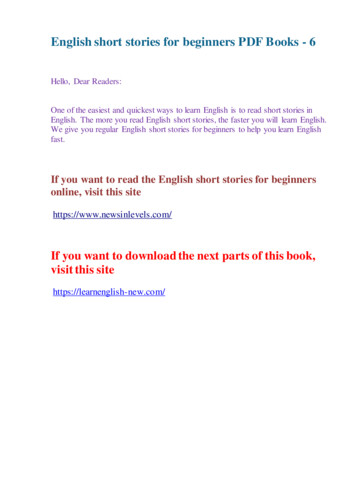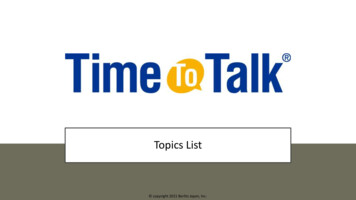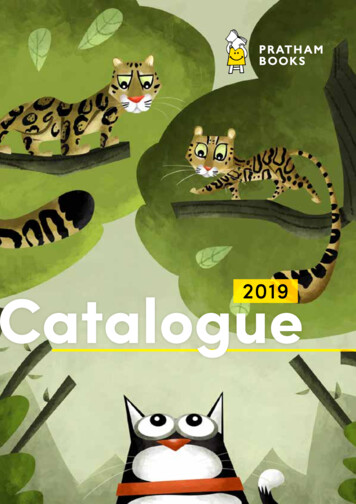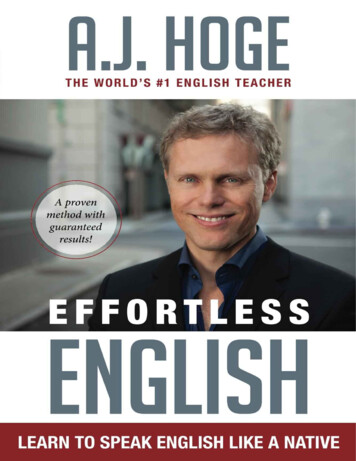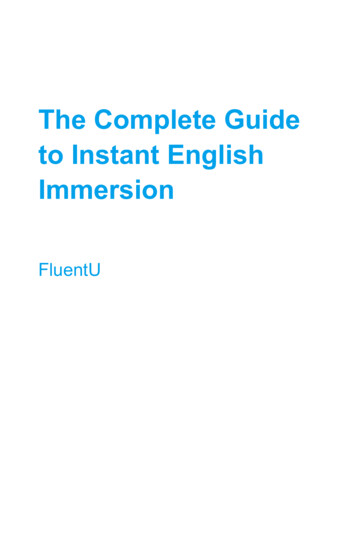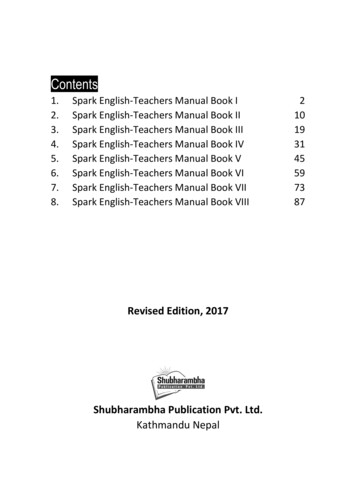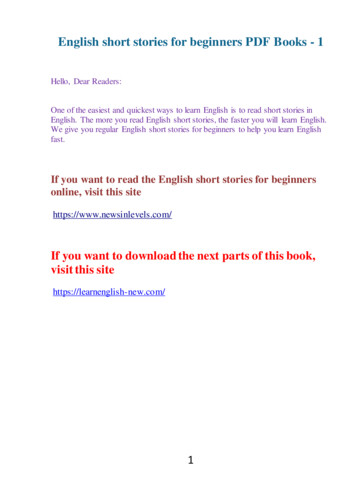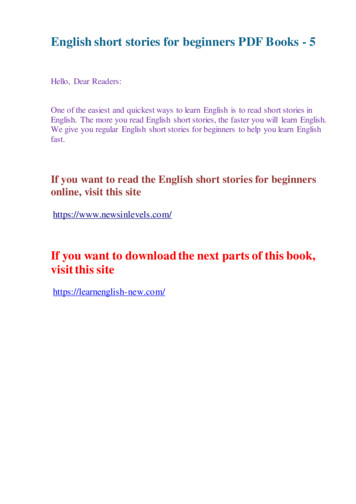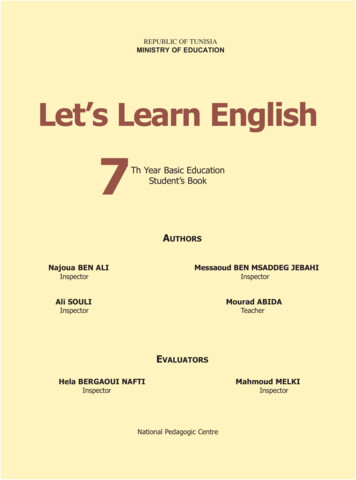
Transcription
REPUBLIC OF TUNISIAMINISTRY OF EDUCATIONLet’s Learn English7Th Year Basic EducationStudent’s BookAUTHORSNajoua BEN ALIMessaoud BEN MSADDEG JEBAHIInspectorInspectorAli SOULIMourad ABIDAInspectorTeacherEVALUATORSHela BERGAOUI NAFTIInspectorMahmoud MELKIInspectorNational Pedagogic Centre
Table of contentsModule 1Section one :Section two :Section three :Section four :Let’s reviewLet’s rememberSelf-evaluationTell me about your familyTell me more about your familyWhat are your hobbies ?How do you spend your day ?581320263339Aly’s friendWhat’s happening ?Welcome to TunisiaTime for lunch40475460667174.Module 2Section one :Section two :Section three :Section four :Let’s reviewLet’s rememberSelf-evaluationModule 3Section one :Section two :Section three :Section four :Let’s reviewLet’s rememberSelf-evaluationAly’s houseUncle Hedy’s farmMarket dayHappy birthday7580869198102105You must be carefulWhat’s the matter ?Let’s keep fitWhat’s the weather like ?107111119125132138140Module 4Section one :Section two :Section three :Section four :Let’s reviewLet’s rememberSelf-evaluationModule 5Section one : Let’s visit Aly’s schoolSection two : Who is your favourite teacher ?Section three : Let’s help othersSection four : Goodbye PeterLet’s remember141150156160165
ACKNOWLEDGEMENTSThe authors would like to thank Mrs Lamia DHAOU ABIDA,Mrs Toumia KHAMMASSI, Mrs Anissa LEGER YAHYAOUI and thepupils Rim BOUSLAMA, Youssef AHRES and Khalil BOUDHINA fortheir valuable contribution and support in the development of thesematerials.We are also grateful to our spouses and families for theirunfailing support.Our thanks are also due to Mrs Hela BARGAOUI NAFTI andMr Mahmoud MELKI who evaluated these materials.Finally, we thank the dedicated staff at CNP, TunisThe Authors
PREFACE* Let’s Learn English is designed for Seventh Year Basic Education pupils. It ismade up of two interdependent Books : a Student Book and an Activity Book.* Let’s Learn English contains five modules dealing with themes that cover therequirements of the English Programmes – Year Seven Basic Education. Eachmodule is divided into 4 inputsections and a review. Each section proposesseveral activities. Ample description on how to use the various activities isprovided in the Teacher’s Book.* We have drawn upon various methodological principles while working on Let’sLearn English since no one single approach or method can claim to beexhaustive and far-reaching.* We have opted for principled eclecticism through the proposal of a variety oftechniques, advocated by different approaches and methods. Role play, minicry,physical responses and repetition are but some of these techniques.* It is our belief that learner-centredness and autonomous learning are essentialin teaching a foreign language. Therefore, most of the activities proposed in Let’sLearn English aim at involving the learner while encouraging learner autonomy.Project Work – the ultimate in collaborative learning is initiated as early as thefirst module. The purpose is to encourage autonomous and collaborative learningthrough the achievement of simple projects.* Recreational and ludic activities (time for a song / time for a joke / listen andcolour, etc) are meant to motivate the young learners and meet their needs forfun and anxiety-free atmosphere while learning a new language.* We shall conclude with a word of caution : Let’s Learn English - in its firstedition - surely presents weaknesses and limitations. In this regard, any criticismand suggestions for improvements that could be incorporated in the secondedition will be welcome.The Authors
PHONETICSYMBOLSLong vowelsShort vowels/ i / sister/ i:/ teacher/ / mother/ a:/ father/ / watch/ :/ sport/ U / good/ U:/school/ / arrive/ :/ early/ æ / family/ e / bedDiphthongs (2 vowels)/ei // ai // i // U // au// e // i // U /daylikeboygonowthereherepoorConsonants/p/ play/k/ class /f/ family/b/ bed/g/ go /v/ very/s/ sport/z/ visit/h/ hello/m/ mother /j/ yes/t/ time /t / children /θ/ birthday /n/ nice /w/ with/d/ day /dz / luggage /a/ brother / / delicious / l /late/ z / usually /r/ read / nJ /morning
enoeludoM
Identifying Asking about age and number PossessionWritingSpeakingListeningHow do youspend yourday?Let's review26Four :What are yourhobbies?Three ening Prepositions Wh- questions Simple Present (3 forms) Adverbs of frequency Linkers Simple present (like - enjoy - love ) To be (3 forms) WH-questions How old How many Short answers/nJ/- / ei / - / e // /-/ // :/- /t0// a: / – / / - / i /Pronunciationspend - get up - sleepbreakfast - lunch /au/-/ai/dinner - wash dress /u:/ :/bed - watch - have - eat- late - early - alwaysnever - usually sometimes - half - past to - quarter -pastime – cyclinghobby – favourite –enjoy – swimming –more – grandparentsparents – children –daugther – sonfamily tree – howmany – how oldmeet Demonstratives Have gotlittle - farmer – friend -brother – sister-pupil – teacher-Lexis Verb to be Subject pronouns Hello / HiGrammarReview / Self-evaluation Describing routines Asking/ Telling the time Asking / Giving information Expressing approval Expressing likes Asking /Giving information IntroducingReadingTwo :Speaking IdentifyingListeningTell me moreabout yourfamily Introducing self and othersReadingTell me aboutyour familyFunction GreetingSkillsSpeakingOne:Section201355PageModule One(step4)Present yourproject in class(step3)write a secondparagraphabout the dailyroutines andhobbies in yourfamily(step2)Put somepictures onyour family treeWrite aparagraph tointroducemembers ofthe family.(step1)Draw a familytreeProject
Activity 1 : Match pictures with words.secretary - farmer - doctor - player - pupil - teacher -a.b.My namede.c.f1Oneis .
Activity 2Complete.Lunch - breakfast - dinner1Linda and Leena have .at 7 o’clock.23At 12, they have. They have.at8 o’clock.Activity 3Complete.Dialogue 2Dialogue 1-Hello. My name is . .Hi. I am Andrew.Nice to meet you. , too.Activity 4It’s six o’clock.- What’s your . ?- Ahmed.- How old are you ?- I am .Read. Draw the hands.It’s twelve o’clock.2TwoIt’s eleven o’clock.
Activity 5Find 4 words in the snail.FamilyActivity 6N ame the sports.ba.3Three
dc.e.gf.4Four
Section OneTell me about your familyActivity 1 a. Look and listen.2Hello, I’m Aly Soltane.I’m 13 years old. I ama pupil in Ryadh prep.school.13This is my fatherHedy. He’s a farmerThis is my mother,Fatma. She’s anEnglish teacher.This is my little sister.Her name is Imene.She’s a pupil.54These are my brothersAhmed and Selim.They are pupils, tooThey are 8 and 6.5Five
b. Listen and match.BrothersFatherMotherSisterSelim and AhmedFatmaHedyImenepupilfarmerteacherpupilsc. Listen and repeat./a:// /fathermotherlittlefarmerbrothersister/i/ This isSingularThese arePlural6SixThis
Activity 2Read. Enact the conversation with your friends.Hello Bob. This ismy friend Jane.Hi, Jane. Niceto meet you.Hello Bob. Nice tomeet you, too.Hello / HiNow introduce yourself.stick yourphoto hereMy name . .I . old.I .prep. school.I am .My name is.This is .Nice to meet you7 Activity 3GreetingSevenIntroducing selfand others
Tell me more about your familySection TwoActivity 1Look and complete on thenext page.Aly’s Family treeGrandfather Grandmother GrandparentsBechir SoltanemotherAly’s family Khadija Soltanefather FatmaparentsHedy SoltaneSons daughter ChildrenSelimAhmedbrothers8EightImene Aly Soltanesister
I’m Aly’s . . I’vegot one . . His nameis Hedy.Bechir SoltaneI am Aly’s brother. I’ve gottwo . andone . .Ahmed SoltanePossessionhave/’ve got.9NineHeSheIt IYouWeTheyhas/’s got.
Activity 2a. Ask and answer. Look at the examplesHave you gotbrothers /sisters ?Yes, I have/No, I haven’t.How many brothers /sisters have you got ?I’ve got(number) .How oldare you ?I’m fifteen.10Ten
b. Listen and repeat ./ // // :/doctorsondaughterstopbrothersportc. Listen and put the words in the right column./ :// // // t /. . . . .more - got - match - four - daughter - son - children - your doctor - chocolate.How many ?How old ?11numberageEleven
SpellingCircle the correct spelling of the word.[daughter - dauter][little - litle][ teacher - techer][fifteen - fiveteen][school - scool ]Activity 3Ask your classmate about his/her family then completethe report.a. Write your mate’s answers here :name: . has gotbrother(s) : (number) .(name(s)) .(age).sister(s) : (number) .(name(s)) .Classmates.(age). .b. Now completeMy classmate’s name is . He / She hasgot .Project workStep 1 : Draw your family tree on a poster.12Twelve
Section ThreeWhat are your hobbies ?Activity 1Complete.cycling - dancing - reading - videogames - football watching cartoons - listening to music - swimming.Hi ! I’m yourfriend Aly. I lovevideogames.We like .very much.He enjoys .13Thirteen
My favourite pastime.My hobby isis .Children like . .They love . .They enjoy . .14Fourteen
Activity 2What is your favourite pastime ? Tell your classmates.Example :Ilike enjoy dancinglove My favourite pastimeis basketball. likeenjoylove Noun phrase15Expressing likes.Fifteen
Activity 3Now ask your classmate about his/her hobbies.Look at this example :2Example :1I love tennis.What isyour favouritepastime ?43No, it isn’t.I like football,too.Is tennisyour onlypastime ?To be : Simple PresentIamWe/You/TheyareAffirmative formHe/She/ItisIamWe/You/Theyare notNegative formHe/She/ItisAmI.we/you/they .?Interrogative form AreIshe/she/it . 16Sixteen
a. Listen and repeat./a://nJ// t // ei /cartoons swimming watchpastime cyclingchildrendancing watching match/ :/playfourgameballfavourite yoursport/e/tenfriendtellb. Listen and match. Number 1 is an example.1. friend/ /7. tennis2. sister/e/8. rugby3. golf/ ei /9. they4. sing/nJ/10. hobbies5. favourite/ /11. swimming6. twelve/i/12. play.playing golfrugby17Seventeen
SpellingListen and write.1. .5. .2. .6. .3. .7. .4. .8. .Dansing or Dancing ?18Eighteen
Activity 4 Interview your classmates about their hobbies.Put a tick ( ).Friday, October 26th, 2007Name 1.Name 2.Name 3.Hobbiesvideogameswatching T.V.dancingplaying footballsingingswimmingreadingplaying sportNow complete the report.(name). likes . and . .(name)(name). loves . only. . and(name). enjoy .Project workStep 2 : Put some pictures on your family tree. Write a paragraph : Introduce your family members (name /age / job).19Nineteen
Section FourHow do you spend your day ?Activity 1Look. Read. Match.It’s six thirty. Timeto get up.1It’s a quarter toseven. Time to havebreakfast.2It’s half past seven. .Time to go to school.3.It’s two o’clock. Timefor lunch.4.It’s nine fifteen p.m.Time for bed.520Twenty
Activity 2Read. Answer. Enact.Tom: Tell me Ahmed. What time do you get up ?Ahmed : I usually get up at six.Tom: Do you always get up early ?Ahmed : No, I don’t. On Sunday, I get up at nine.Tom: What do you do on Sunday ?Ahmed : In the morning, I always do my homework. In theafternoon, I usually play football with my friends.I sometimes go cycling.Tom: That’s great. You are very active.Question :Write True «T» or False «F».1. Ahmed always gets up early on Sunday. []2. Ahmed usually plays football in the morning. []3. Ahmed never does his homework in the afternoon. []– at time– in part of the day– on day.21Twenty-one
Activity 3Now tell meabout your day.Example :I wash and dressat 6 O’clock am.have breakfast/eatdo homeworkplay/go cycling/practise sporthave dinner/lunchwatch cartoons22go to bedTwenty-two
a. Listen and repeat./ u /gohomeworkno/ ai // u:/timecyclingnineschoolcartoontooafternoon/ : /earlyhomeworkherthirteenb. Same or different ? Write (S) or (D)Example :a watchtell – me (D)two – too (S)son – old (.)sing – like (.)match – watch (.)bed – breakfast (.)uncle – lunch (.)go – got (.) alwaysusuallysometimesnever100 %90 %50 %0%23Adverbs of frequencyTwenty-three
SpellingListen and write.1. .2. . 3. .4. .5. . 6. .The simple presentAffirmative formIYouWeThey VerbNegative formIYouInterrogative formIyouDo Verb ?weWe do not / don’t VerbtheyTheyHeHeheShe Verb S She does not / doesn’t Verb Does she Verb ?ItItitI get up late on Sunday24Twenty-four
Activity 4Read the table about Tom’s activities onSunday and complete the paragraph.On Sunday, Tom always gets uplate. HeActivityTime.get up9 a.m.have breakfast9:15.go cycling10:00.visit grandparents14:00.play with friends17:00.have dinner with family 19:00.go to bed21:30HomeworkWhat do you do on Sunday ? Write a short paragraph.Project workStep 3 : Write a second paragraph about the hobbies of your familymembers Write a third paragraph about the daily routines in yourfamily.25Twenty-five
Let’s reviewActivity 1 Look at the family tree and complete thesentences. Number 1 is an example.Steve GrandfatherLisa GrandmotherDaveMartinAnnRobertJane1. Ann is Jane’s mother.2. Martin is Robert’s. .3. Steve is Martin’s . .4. Dave is Lisa’s . .5. Jane is Dave’s . .6. Jane is Robert’s . .7. Martin, Robert and Jane are Ann’s . .26Twenty-six
Activity 21. ?3. ?5. ?Complete with the right questions fromthe box.2. ?I’mtwelve.My nameis Dorra.4. ?6. ?It’s fourthirty.1. What time is it, please ?At fiveo’clock.I’ve got oneson and onedaughterIt’s myfavouritesport4. What’s your name ?2. How many children have you got ? 5. How old are you ?3. Do you like football ?6. What time is the film ?is myWhat? !!name27Twenty-seven
Activity 3Complete the dialogue.– Hello ! I am Amine.– ., My name is Sarra.– ., Sarra.– Pleased to meet you, too.– Are you in my class ?– Yes, . .– Have you got friends at this school ?– No, . .Activity 4Fill in the blanks with words from the box.goes - like - has - doesn’t - at - is - dresses up - has in - enjoys - eats - has got - at - in - reads - is - takes.Miss Williams usually gets up at 6.30 a.m. She 1 .breakfast then 2 . . She 3 .the bus to school. Miss Williams 4 . an Englishteacher, she 5 . nice. Her pupils 6 .her. Miss Williams 7 . go home 8 .midday ; she 9 . at school. She 10 .home 11 . five o’clock 12 . theafternoon. 13. the evening, she 14 .dinner, watches T.V. and 15 . the newspaper.ngReadi28Twenty-eight
Activity 5 What time is it ? Write the answers. Read tothe class.a. .b. .c. .d. .e. .f. .g. .h. .i. .WatchClock29Twenty-nine
Activity 6 Circle the correct word.Karim is my (freind - friend). He is(fiveteen - fifteen) years old. His(favrite - favourite) pastime istennis. Helikeslisstening)to(listeningmusic-too. He(olways / always) plays the guitar inthe afternoon.Playing the guitarActivity 7Reorder the letters to form words.Mrs Larson is a [ h - e - a - r - c - t - e ]. Her pupils are[ t - i - t - l - e - l ] .children in a [ p - m - y - r - a - r - i ]. school.30Thirty
Activity 8 Complete this paragraph about yourself.My name. . I am a pupil at .prep.school. I .old. My father . .I’ve got . and .sisters. . is my favourite . .I enjoy . too.Activity 9Interview your classmate and complete.My classmate’s name is .– Her / His family name is . .– She / He is . old.– She / He’s got . brothers.– She / He . sisters.– Her / His favourite pastime is . .– She / He always . .– She / He never . .31[Draw or stick yourclassmate’s photo]Thirty-one
Activity 10Put these words in the right boxes.name - four - farmer - favourite - daughter - more - ball - game cartoons - pastime dancing - go - early - thirteen - nine - cycling homework - too - afternoon - no - Thursday./a://ei// : // ://,u//u://ei//ei// u//ai/Playing videogames is children’s favourite pastime.Project workStep 4 : Present your family to your classmates :– Show your family tree (and pictures).– Read the text about your family.32Thirty-two/ai/
Let’s RememberPersonal PronounsIYouHeSheItWeYouTheyArticlesan vowelexample : an activitya consonant example : a sport.DemonstrativesThisThesesingularpluralThis is a flowerThese are booksThis is a TV set.33Thirty-three
WH - questionsWhatobjectExample :What isthis ?This is ablackboardHow oldare you, Ines ?How oldageI amfour years old.34Thirty-four
What timetimeExample :– What time is it, please ?– It’s ten past ten.How manynumberI’ve got oneHow manysister only.brothers and sistershave you got ?Possession IYouWeTheyhave/’ve got.HeSheIthas/’s got.Example :I’ve got a verynice sister.35Thirty-five
Is itsimple ? !The simple presentVerbTo beFormhave gotAffirmative amSubject are is have/ ’veSubject got has / ‘sNegative haven’t amSubject is not Subject got hasn’t areother verbsSubject verb verb s do not / don’tSubject Verb does not/doesn’t AmHaveDoInterrogative Is Subject ? Subject got ? Subject Verb ?AreHasDoesExamples : I am a pupil but she is a teacher. He has got brothers but I haven’t. Does she like football ? No, she doesn’t.36Thirty-six
FunctionsMy na.!illo is T .eHnme f r i c aanAm’I1. Introducing oneself2. Introducing othersNiceme toetyou.d toPlease, too.uoytmeeThis isMrs Jones3. GreetingHello ! ? !Hi ! ? !37Thirty-seven
Expressing LikesI like music and ice cream.They love Disneyland.He enjoys videogames.Football is my favourite sport.Pronunciation/ / / i / / / / e //nJ// t / / ei/ /ai/ / u//a:/ /u:/ / :/bus sing gotbed singwatch name five oldfarmer twoballson this hobby friend morning children game my homework past toodrawdoes itnotseven evening teacher eight like helloschool your38Thirty-eight
Self-evaluationTick the right box.Now I can . greet people. introduce myself. introduce my family / my friends. talk about family relations. ask about and tell the age. tell the time. speak about my hobbies. speak about my daily routines. draw my family tree. listen then answer questions. complete a short paragraph. pronounce words correctly.39Thirty-nineGoodLuck !
* Let's Learn Englishis designed for Seventh Year Basic Education pupils. It is made up of two interdependent Books : a Student Book and an Activity Book. * Let's Learn Englishcontains five modules dealing with themes that cover the requirements of the English Programmes - Year Seven Basic Education. Each

